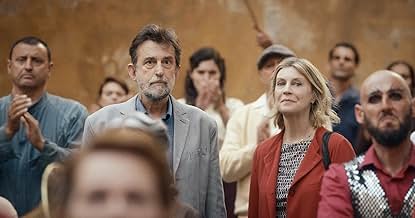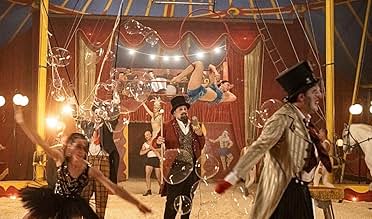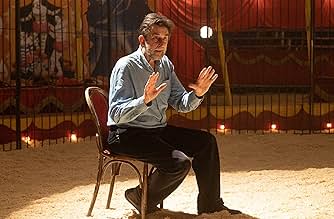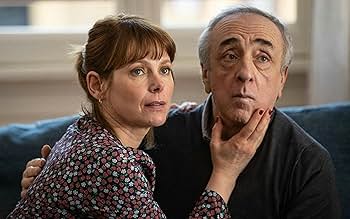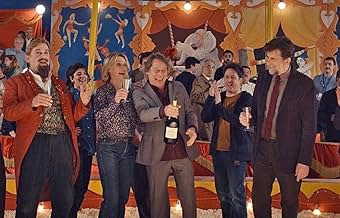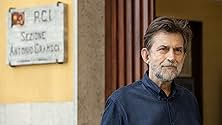IMDb-BEWERTUNG
6,7/10
3831
IHRE BEWERTUNG
Füge eine Handlung in deiner Sprache hinzuA movie director struggles with his relationship with his family, and with his latest movie, about the impact on the Italian Communist Party of the USSR invasion of Hungary in 1956.A movie director struggles with his relationship with his family, and with his latest movie, about the impact on the Italian Communist Party of the USSR invasion of Hungary in 1956.A movie director struggles with his relationship with his family, and with his latest movie, about the impact on the Italian Communist Party of the USSR invasion of Hungary in 1956.
- Auszeichnungen
- 2 Gewinne & 21 Nominierungen insgesamt
Empfohlene Bewertungen
Someone asked me one day which person in history I would want to have lunch with. While Julius Caesar, Jesus Christ, Napoleon or George Washington may have been good candidates, I couldn't think of a name that appealed more to me than Nanni Moretti. Over the last 25 years, starting with the exceptional Palombella Rossa, Nanni Moretti has had an uninterrupted streak of masterpieces including Caro Diario, The Son's Room, The Caiman, We Have a Pope, Mia Madre and Three Floors, to name a few, which rank among the best films made in that time period, and make Nanni Moretti one of the greatest living filmmakers.
With that track record, I imagine Moretti could only disappoint. And disappoint he does with A Brighter Tomorrow. Don't get me wrong, we are still talking about one of the best filmmakers in the world, one that certainly knows how to make a good movie. But this one feels miles behind his other films. One of the things that hit you is how self-referential it is. From the name of the circus in the film (Budavari, a reference to Palombella Rossa) to the obsession with shoes (a reference to his earlier films, in particular Bianca) to a scene playing with a soccer ball (a reference to Caro Diario), it feels reheated, almost vain, from a filmmaker who always looked decidedly into the future. And this feeling of lack of ideas is made worse by abundant references to classic films, in particular those of Fellini.
In a way, these shortcomings arise from the subject of the film itself: it is ultimately about the gap between Moretti's values, represented by his films and his film culture, and today's world. But the issue is the message feels conveyed without passion, which has been the one constant in his filmography to this day. A Brighter Tomorrow therefore disappoints. We can only hope for Moretti's next film and remember all of his previous ones.
With that track record, I imagine Moretti could only disappoint. And disappoint he does with A Brighter Tomorrow. Don't get me wrong, we are still talking about one of the best filmmakers in the world, one that certainly knows how to make a good movie. But this one feels miles behind his other films. One of the things that hit you is how self-referential it is. From the name of the circus in the film (Budavari, a reference to Palombella Rossa) to the obsession with shoes (a reference to his earlier films, in particular Bianca) to a scene playing with a soccer ball (a reference to Caro Diario), it feels reheated, almost vain, from a filmmaker who always looked decidedly into the future. And this feeling of lack of ideas is made worse by abundant references to classic films, in particular those of Fellini.
In a way, these shortcomings arise from the subject of the film itself: it is ultimately about the gap between Moretti's values, represented by his films and his film culture, and today's world. But the issue is the message feels conveyed without passion, which has been the one constant in his filmography to this day. A Brighter Tomorrow therefore disappoints. We can only hope for Moretti's next film and remember all of his previous ones.
On the occasion of his 70th birthday, Director Moretti sends a heartfelt love letter to his fans, reliving the themes that made him popular and acclaimed over the course of 50 years. The story jumps between three distinct layers: Moretti's own life, the movie he is shooting, and the movie he is about to make, with each providing its own share of humorous moments, successes, and of course, failures (due to Moretti's intrinsically pessimistic outlook). Compiled from both his own works and the works of those who have inspired him, particularly Federico Fellini, the movie is ultimately an observation of the passage of time, with a faint but lasting hope of a future. When you let it be.
I didn't like this movie at all. Perhaps this was a movie for die hard Moretti fans that saw all his movies? For me the story was very weak, the pace was utterly slow and clearly they should prohibit certain directors to act in their own movies. There were some nice shots and sure I could smile a few times. I guess a metafilm can work, but I couldn't relate to neither one of the stories and both of the stories were quite superficial and unexciting. In short: I agree with the reviewer of the gardian who writes: "I'm sure the future will be brightened by another, better Moretti film - this one is best forgotten."
#Cannes2023# A film by a white old male director that far exceeded my expectations. It can be considered as a self-reflection and self-deprecating work from the usually narcissistic Moretti. He directed and acted in a movie that explores his journey from denial to ultimately admitting his creative decline, the irrelevance of his themes (at least to a diminishing audience), his inability to work without his wife "assistant" and the growing resentment from his crew towards his mansplaining . In the end, he also concludes with a false sense of hope, summarizing it as a lament for the leftist movements of the 1950s and acknowledging his inability to find a good ending. This self-analysis and sincere display of vulnerability moved me. There are countless directors in their old ages who have run out of creative juices, but not many can be this candid. Additionally, there are Fellini-esque elements throughout the film, with circus motifs and ensemble dancing, adding a touch of delightful nostalgia. @ Cannes Cineum Aurore.
A film that's different from the usual, almost a metafilm into which other films are interwoven. Moretti talks to us about history, politics, love, violence, and physical decay. In some ways, it's also very autobiographical. Despite the many themes the director has inserted, everything flows smoothly towards an ending that leaves some threads of hope for the audience. I left the cinema feeling happy, despite everything. For this, I want to thank Moretti. At some point, it wasn't so obvious. The actors' performances were also great, especially those of Silvio Orlando and Margherita Buy, as well as Amalric's. In short, it's the usual Moretti film that never disappoints and I believe can be appreciated not only by an Italian audience but also an international one.
Wusstest du schon
- WissenswertesSelected to compete for the Palme d'or in the 2023 Cannes Film Festival. This is the ninth time that a film from director Nanni Moretti is selected at Cannes; every movie he made since "Caro diario" has been at Cannes, he even won the Palme d'or in 2001 with "The Son's Room."
- VerbindungenFeatures Das süße Leben (1960)
Top-Auswahl
Melde dich zum Bewerten an und greife auf die Watchlist für personalisierte Empfehlungen zu.
- How long is A Brighter Tomorrow?Powered by Alexa
Details
- Erscheinungsdatum
- Herkunftsländer
- Sprachen
- Auch bekannt als
- A Brighter Tomorrow
- Drehorte
- Produktionsfirmen
- Weitere beteiligte Unternehmen bei IMDbPro anzeigen
Box Office
- Budget
- 12.284.110 € (geschätzt)
- Weltweiter Bruttoertrag
- 6.668.544 $
- Laufzeit
- 1 Std. 35 Min.(95 min)
- Farbe
- Seitenverhältnis
- 1.85 : 1
Zu dieser Seite beitragen
Bearbeitung vorschlagen oder fehlenden Inhalt hinzufügen

![Trailer [OV] ansehen](https://m.media-amazon.com/images/M/MV5BZjUxOGY3NjUtN2RiNy00NDlkLWE4MGYtZjkxMTU2MmNmOTBmXkEyXkFqcGdeQXRyYW5zY29kZS13b3JrZmxvdw@@._V1_QL75_UX500_CR0)

